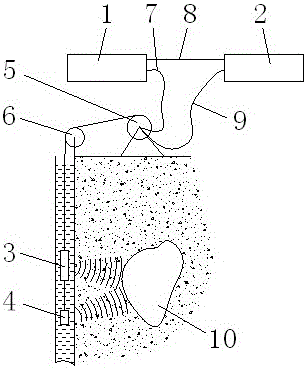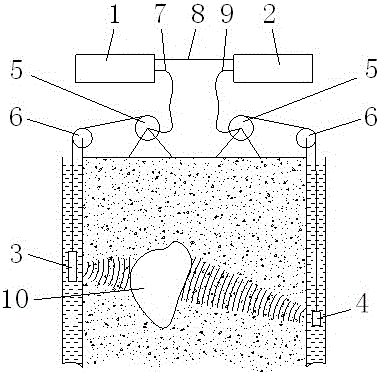A Method of Using Resonant Wave Imaging to Detect Caves
A resonant wave and karst cave technology, which is applied to the measurement of resonance frequency, measuring devices, geophysical measurements, etc., can solve the problems of ineffective cave detection and reliable detection, etc., and achieves convenient operation and high work efficiency , the effect is obvious
- Summary
- Abstract
- Description
- Claims
- Application Information
AI Technical Summary
Problems solved by technology
Method used
Image
Examples
Embodiment 1
[0019] A method for detecting caves using resonance waves of the present invention is to use an acoustic wave emitting device as a vibration source to send excitation waves around the cave 10, and utilize the phenomenon that the seismic waves or sound waves excited by the excitation waves in the ground resonate with nearby caves. The device receives resonant waves, and detects unknown caves around the detection point according to the received resonant waves. The detection points are more than two boreholes, the distance between the boreholes is 10-50 meters, and the hole depth is greater than the hole distance. The transmitting device and the receiving device maintain a fixed height difference, sequentially stimulate and receive from top to bottom or bottom to top in the same vertical borehole filled with water, and obtain a vertical axis with the depth of the hole and the fluctuation time The wave array graph on the horizontal axis is called single-hole detection; in single...
Embodiment 2
[0022] A method for detecting karst caves utilizing resonance waves of the present invention is used to detect karst caves. The method is to use an acoustic wave emitting device to send excitation waves around the karst cave 10 as a vibration source, and utilize the seismic waves or sound waves excited underground by the excitation waves to communicate with nearby The phenomenon of resonance in the cave, the resonance wave is received by the receiving device, and the unknown cave around the detection point is detected according to the received resonance wave. The detection points are more than two boreholes, the distance between the boreholes is 10-50 meters, and the hole depth is greater than the hole distance. The transmitting device and the receiving device maintain a fixed height difference, respectively put them into two vertical boreholes filled with water to stimulate and receive sequentially from top to bottom or bottom to top, and obtain the vertical axis with the de...
PUM
 Login to View More
Login to View More Abstract
Description
Claims
Application Information
 Login to View More
Login to View More - R&D
- Intellectual Property
- Life Sciences
- Materials
- Tech Scout
- Unparalleled Data Quality
- Higher Quality Content
- 60% Fewer Hallucinations
Browse by: Latest US Patents, China's latest patents, Technical Efficacy Thesaurus, Application Domain, Technology Topic, Popular Technical Reports.
© 2025 PatSnap. All rights reserved.Legal|Privacy policy|Modern Slavery Act Transparency Statement|Sitemap|About US| Contact US: help@patsnap.com


